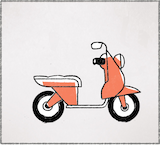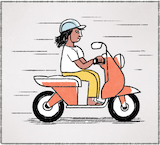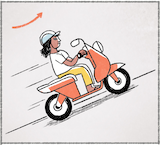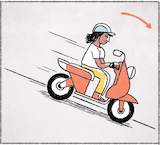



อันนี้คืออี่หยัง อันนี้เป็นมอเตอไซ เป็นมอเตอไซเอาไว้ถ้าขี่ หลือเอาไว้ถ้าขับ
มอเตอไซเป็นแบบใด มอเตอไซกะเป็นลด เป็นลดมอเตอไซนั้นหละ
แล้วลดมอเตอไซมันคันใหญ่บ่ กะคันบ่ใหญ่ปานใด กะแล้วแต่ลุ้น หลือว่าแล้วแต่ยี่ห้อ บางคันกะใหญ่ บางคันกะน้อย
ลดมอเตอไซสีหญัง ลดมอเตอไซสีแดง
แล้วลดมอเตอไซกะมีล้อพ้อม มีเบาะนั่งพ้อม มีกะจกพ้อม มีแนวบิดพ้อม มีไฟพ้อม มอเตอไซกะมีส่วนปะกอบหลายสิ่งหลายอย่าง
13
เขากำลังเฮ็ดหญัง พุซายคนนี้เขากำลังขับลด เขากำลังขับลดมอเตอไซ เขากำลังขับไปทางหน้า
เขาสิขับไปใส จัก จักคือกัน จักว่าเขาสิขับไปใส ฮู้แต่ว่าเขากำลังขับไปเลี้ยยๆ ขับอยู่เทิงถะหนนนั้นหละ
14
เขากำลังเฮ็ดหญัง เขากำลังขับลดมอเตอไซ กำลังขับลดมอเตอไซขึ้นโนน กำลังขับลดมอเตอไซขึ้นโนนอยู่พุ้นหนะ กำลังบืนขึ้นโนนอยู่
เขาขับลดมอเตอไซจักคน เขาขับพุเดียว เขาไปของเขาพุเดียวนั้นหละ พุเดียวข้อหล้อ
15
เขากำลังเฮ็ดหญัง เขากะขับมอเตอไซนั้นหละ เขากำลังขับมอเตอไซลงโนน ลดมอเตอไซกำลังลงโนนอยู่ หลือว่าลงค้อยนั้นหละ
แล้วเขาขับเล็วบ่ จักคือกัน อาดสิบ่เล็ว เพาะว่าญามลงค้อยหลือว่าลงโนน ขับลดต้องขับค่อยๆ ขั้นขับเล็วหลายมันกะอันตะลาย เพาะว่ามันขับลงค้อย มันเป็นโนน
Link to overview page
Link to dictionary
| Isaan | Pronunciation | Tones | Thai | English/Notes |
|---|---|---|---|---|
| อัน | an | M | อัน | 1. thing, object 2. general clf. for objects |
| นี้ | ni: | HF | นี้ | 1. this 2. here |
| คือ | khʉ: | HR | คือ | 1. to be, to resemble, like, as 2. why {บักหล้าคือบ่เก็บโต่ะแน่ = [addressing a young boy] Why haven't you cleared the table?} |
| อี่หยัง | i:-yaŋ | H-M | อะไร | 1. what {นี้คืออี่หยัง = What is this?} {มื้อนี้เจ้าเฮ็ดอี่หยัง = What are you doing today?} {กินเข้างายกับอี่หยัง = What did you have for breakfast?} 2. something, anything, (in negations) nothing {บ่ต้องเฮ็ดอี่หยังอีกเลยนอกจากใส่ปุย = [we] don't need to do anything besides adding fertilizer} |
| เป็น | pen | M | เป็น | 1. to be, to exist 2. to be able to 3. to suffer, sth. happens to 4. เป็นหญัง[...]คือ in initial position: why? {เป็นหญังเขากะคือแปงฟัน = Why is he brushing his teeth?} {เป็นหญังเคี่ยงบินมันคือสิตก = Why is the airplane falling down?} |
| มอเตอไซ | mɔ:-tə:-sai | HR-M-HR | มอเตอร์ไซค์ | motorbike |
| เอา | ao | M | เอา | to take, to give {เขากำลังเอาก่องไปซั่ง = he's taking the boxes to weigh them} {หมอกำลังเอายาให้คนป่วยกิน = the doctor is giving medicine to the patient} {เอาไว้ถ้า = is for, is used for, has the purpose of} |
| ไว้ถ้า | wai-tha: | HF-LF | usually in a positive statement or answer: is for, is used for, has the purpose of {กะทะมีไว้ถ้าทอด = a pan is for frying} {น้ำบักนาวมีไว้ถ้าปุงอาหาน = lime juice is used to season food} {ปากกามีไว้ถ้าเขียน = a pen is for writing} {กะเทียมเอาไว้ถ้าเฮ็ดแนวกิน = garlic is used to make food} {ขาเอาไว้ถ้าญ่าง = legs are for walking} {เกิบเอาไว้ถ้าใส่ = shoes are for wearing} Notes: see also ไว้ |
|
| ขี่ | khi: | H | ขี่ | to ride, to drive {ขี่มอเตอไซ = to ride a motorbike} {ขี่ควย = to ride on a buffalo} {ขี่เลีย = to take or travel on a boat} |
| หลือ | lʉ: | M | หรือ | or |
| ขับ | khap | M | ขับ | to drive, to ride |
| แบบ | bɛ:p | LF | แบบ | 1. example, model, kind 2. style, form, pattern, design |
| ใด | dai | M | ใด | 1. which, that one which, what, how {เขานั่งแบบใด เขานั่งขดตะหมาดอยู่ = How is he sitting? He's sitting cross-legged.} {ตอนใด = when?} 2. whichever, whoever {หม้องใดหม้องหนึ่ง = some place, somewhere} {ขั้นเฮาอยากตื่นญามใด เฮากะตั้งเวลาปุกญามนั้น = If we want to get up at a certain time, we set the alarm to that time} Notes: sentence-final often with a marked rising tone |
| กะ | ga | M | ก็ | 1. then, consequently 2. also |
| ลด | lot | H | รถ | 1. car, motorized vehicle 2. vehicle, cart {ลดขายแนวกิน = food cart} |
| นั้นหละ | nan-la | HF-M | นั่นแหละ | auxiliary for emphasis at the end of a phrase |
| แล้ว | lɛ:o | HF | แล้ว | 1. finished 2. already 3. and then, and next (especially แล้วกะ) 4. auxiliary for past tense |
| มัน | man | HR | มัน | it (also used to refer to people) |
| คัน | khan | HR | คัน | clf. for cars, trains, motorbikes, boats {ลดไฟคันนี้ = this train} {ลดเก็งคันสีเขียวคันน้อย = a small green car} |
| ใหญ่ | ɲai | H | ใหญ่ | large, big |
| บ่ | bɔ: | H | ไม่ | 1. no, not 2. question particle, transforming a statement into a question Notes: spelling exception in line with common usage on social media |
| ปานใด | pa:n-dai | M-M | เท่าไหร่, มาก | 1. after negative: (not) very, (not) so much {บ่ใหญ่ปานใด = not so large, not very large} 2. how much, how many {เฮาบ่สามาดนับได้ว่ามันมีหลายปานใด = it's impossible to count how many there are} |
| แล้วแต่ | lɛ:o-tɛ: | HF-H | แล้วแต่ | up to, depending on |
| ลุ้น | lun | HF | รุ่น | 1. model, version 2. generation, age |
| ว่า | wa: | H | ว่า | 1. that, as {คำว่า X = the word X} 2. to say |
| ยี่ห้อ | yi:-hɔ: | H-LF | ยี่ห้อ | brand, brand name Notes: see also ยี้ฮ้อ |
| บาง | ba:ŋ | M | บาง | 1. some {สัดบางโตบ่มีขา = some animals don't have legs} {บางคนสิมักกินกวยเตียวแทนเข้า = some people like to eat noodle soup instead of rice (dishes)} {บางสิ่งบางอย่าง = something, anything} 2. thin |
| น้อย | nɔ:i | HF | น้อย | 1. few, little 2. small |
| สี | si: | M | สี | 1. color 2. colored pencil, crayon |
| หญัง | ɲaŋ | M | อะไร, เป็นหญัง = ทำไม | 1. what {เขากำลังเฮ็ดหญัง = What is he doing?} {ธูปเอาไว้เฮ็ดหญัง = What are incense sticks for?} 2. something, anything, (nothing) 3. เป็นหญัง[...]คือ in initial position: why {เป็นหญังเขาคือใส่บักพิกลงไปในกวยเตียว = Why is he putting chili in [his] noodle soup?} {เป็นหญังหน้าต่างมันคือเปิด = Why is the window open?} {เป็นหญังมันคือมีควนไฟ = Why is there smoke?} |
| แดง | dɛ:ŋ | M | แดง | red |
| มี | mi: | HR | มี | 1. to have 2. there is |
| ล้อ | lɔ: | HF | ล้อ | wheel |
| พ้อม | phɔ:m | HF | พร้อม | at the same time, also, too {มีตะเว็นพ้อม = the sun's out, too} {กะทะมีด้ามพ้อม = the pan has also a handle} |
| เบาะนั่ง | bɔ-naŋ | M-H | เบาะนั่ง | padded seat |
| กะจก | ga-jok | M-M | กระจก | 1. glass, glass pane, glass panel 2. mirror |
| แนวบิด | nɛ:o-bit | HR-M | คันเร่ง | accelerator |
| ไฟ | fai | HR | ไฟ | 1. fire, flame 2. electricity, power 3. light |
| ส่วนปะกอบ | su:an-pa-gɔ:p | H-M-LF | ส่วนประกอบ | component, element |
| หลายสิ่งหลายอย่าง | la:i-siŋ-la:i-ya:ŋ | M-H-M-H | หลากหลาย, มากมาย, หลายอย่าง | varied, various, several (kinds etc.) |
| เขา | khao | M | เขา | personal pronoun: he, she |
| กำลัง | gam-laŋ | M-HR | กำลัง | auxiliary indicating continuous or progressive action |
| เฮ็ด | het | H | ทำ | to do, to make |
| พุซาย | phu-sa:i | H-HR | ผู้ชาย | man, male |
| คน | khon | HR | คน | person, people |
| ไป | pai | M | ไป | 1. to go 2. auxiliary indicating action extending into the future |
| ทางหน้า | tha:ŋ-na: | HR-LF | ทางหน้า | forward, in front (of) |
| สิ | si | M | จะ | future tense auxiliary {เขากำลังสิตื่น = he's about to wake up} {สิไปตะหลาด = [I'm] going to the market} |
| ใส | sai | M | (ที่)ไหน | 1. where? {สิไปใส = Where are [you] going?} {มาแต่ใส = Where are [you] coming from?} {กะทะอยู่ใส = Where's the pan?} 2. somewhere, anywhere {ใสกะได้ = anywhere, wherever you like} |
| จัก | jak | M | จัก | 1. answer to a question: [I] don't know, don't know exactly, [I'm] not sure {พุซายคนนี้เขาเถ้าไป่ จัก จักเถ้าหลือบ่เถ้า เบิ่งบ่ค่อยออก = Is this man here already old? I don't know. I can't see clearly whether he's old or not.} {เขาเว้ากันอยู่ใส จักคือกัน = Where are they talking? I don't know either.} 2. exact(ly), what exactly {จักต้มอี่หยังกะบ่ฮู้ = I don't know what (exactly) he is cooking} {บ่ลู้คือกันจักปาอี่หยัง = I don't know either what kind of fish this is} 3. how much/many? {ต้นไม้มีจักต้น = How many trees are there?} {ตอนนี้จักโมงแล้ว = What time is it now?} {มือของเฮานี้สิมีจักนิ้ว = How many fingers do our hands have?} 4. a bit, a little bit {จักหน่อย/จักหน่อยหนึ่ง = a bit, a little bit} |
| คือกัน | khʉ:-gan | HR-M | เหมือนกัน | 1. also, likewise, similarly {ยินดีที่ได้ฮู้จักคือกันคับ = Nice to meet you too!} 2. in negative sentences: either {บ่ลู้คือกัน = I don't know either} {จักคือกัน = I don't know (either)} |
| ฮู้ | hu: | HF | รู้ | 1. to know 2. to understand Notes: equivalent to ลู้ |
| แต่ว่า | tɛ:-wa: | H-H | แต่ว่า | 1. but 2. only {ฮู้แต่ว่าเขายืนอยู่พุเดียว = I only know that he's standing there by himself} |
| เลี้ยยๆ | li:ai | HF | เรื่อยๆ | continuously Notes: pronunciation: also realized as เลื้อยๆ |
| อยู่ | yu: | H | อยู่ | 1. to be (located) at 2. yet, still 3. auxiliary indicating continuous or progressive action {ทอดปาอยู่ในกะทะ = (in the process of) frying a fish in the pan} {แม่กำลังเมี้ยนเฮียนอยู่ = mother is cleaning/tidying up the house} |
| เทิง | thə:ŋ | HR | บน | 1. on, on top of, at, in {เทิงโต่ะ = at/on the table} {กบมันนั่งอยู่เทิงใบบัว = the frog is sitting on the lotus leaf} {เทิงท้องฟ้า = in the sky} {มันแล่นอยู่เทิงลาง = [the train] runs on rails} {มีคนนั่งอยู่เทิงลดสามล้อสามคน = there are three people sitting in the tuk tuk} 2. up, upward Notes: pronunciation: also realized as ทัง |
| ถะหนน | tha-non | M-M | ถนน | road, street |
| ขึ้น | khʉn | LF | ขึ้น | 1. to go up, to increase 2. sun: to rise {ตะเว็นกำลังขึ้น = the sun is rising} 3. more 4. bus/train etc.: to get on, to board {พุโดยสานขึ้นลดไฟเบิดแล้ว = all passengers have boarded the train} |
| โนน | no:n | HR | โนน, เนิน | hill |
| พุ้นหนะ | phun-na | HF-H | นู่นแหละ | auxiliary for emphasis at the end of a phrase Notes: variant of พุ้นหละ |
| บืน | bʉ:n | M | ขั้นที่สูงๆ, ขึ้นเนิน, คลาน | to move up, crawl up Notes: translation to be confirmed |
| พุเดียว | phu-di:ao | H-M | คนเดียว | 1. alone, by oneself {เขากำลังยืนอยู่พุเดียว = she's standing by herself} {เขานั่งอยู่พุเดียว = he's sitting by himself} 2. one person |
| ของ | khɔ:ŋ | M | ของ | of, belonging to |
| ข้อหล้อ | khɔ:-lɔ: | LF-LF | เท่านั้น, ขนาดนั้น, น้อยๆ | only {ต้นไม้มีต้นเดียว ต้นเดียวข้อหล้อ = there's one tree, only one tree} {มีบ้านหลังเดียวข้อหล้อ = there's only one house} |
| ลง | loŋ | HR | ลง | 1. to descend, to lower, to go down 2. down 3. bus/train etc.: to get off, to disembark {คนกำลังลงลดบั่ด = people are getting off the bus} 4. boat/ship etc.: to get on, to board {เขากำลังญ่างลงเลีย = he's boarding/getting on the boat} |
| ค้อย | khɔ:i | HF | slope, sloping, descending {หม้องใดค้อย น้ำมันกะสิไหลไปหม้องหั้น = where there is a slope, that's where the water flows} | |
| เล็ว | leo | HR | เร็ว | fast, quick |
| อาด | a:t | LF | อาจ | 1. might, may, will 2. likely |
| เพาะว่า | phɔ-wa: | H-H | เพราะว่า | because |
| ญาม | ɲa:m | HR | ยาม | 1. period of time {ญามมื้อเซ้า = morning} {ญามเที่ยง = noon} 2. when, while {ญามทอด ต้องใซ้น้ำมันพ้อม = one needs to use oil when frying} {ญามสิออกไปข้างนอกกะต้องใส่เกิบ = when one goes out, ones has to wear shoes} |
| ต้อง | tɔŋ | HF | ต้อง | to have to, must |
| ค่อย | khɔ:i | H | ค่อย | 1. soft, gentle 2. little by little, gradually |
| ขั้น | khan | LF | เมื่อ | when, if |
| หลาย | la:i | M | เยอะ, มาก | many, much, very |
| อันตะลาย | an-ta-la:i | M-M-HR | อันตราย | 1. danger 2. dangerous |